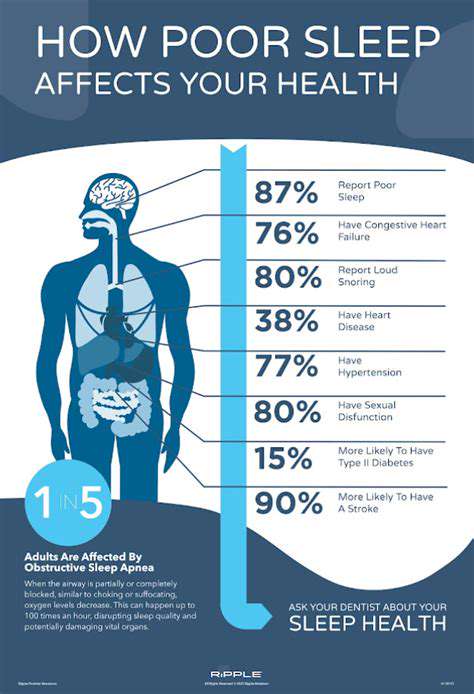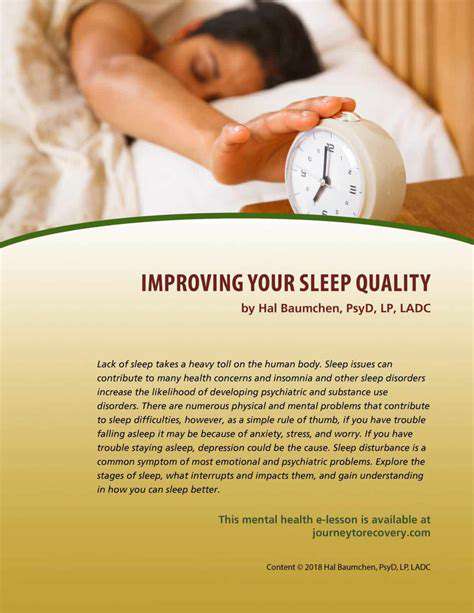Poor Sleep Quality: Causes, Effects, and Solutions for Better Rest
Common Causes of Poor Sleep Quality
Stress and Anxiety
Stress and anxiety are common culprits that can significantly disrupt sleep quality. When the mind is preoccupied with worries or fears, it becomes increasingly difficult to relax and fall asleep. This hyperarousal can lead to insomnia, where individuals lie awake for prolonged periods, fearing they won't get enough rest.
Furthermore, chronic stress activates the body's fight-or-flight response, releasing hormones such as cortisol that can keep people alert and awake, even when they are physically tired. Developing healthy coping mechanisms, like mindfulness or meditation, can potentially reduce anxiety and improve sleep quality.
Recognizing the link between stress and sleep is vital. Individuals should seek to create a calming bedtime routine that helps ease anxiety and prepares the body for restful sleep.
Excessive Screen Time
In today's digital age, excessive screen time before bedtime has become a significant factor in poor sleep quality. Devices like smartphones, tablets, and computers emit blue light, which interferes with the production of melatonin, a hormone critical for regulating sleep-wake cycles.
This light exposure can trick the brain into thinking it’s still daytime, leading to difficulties in falling asleep and staying asleep. Many experts recommend establishing a digital curfew—no screens at least an hour before bed—to mitigate this effect and promote better sleep hygiene.
Additionally, engaging in screen time can be mentally stimulating, leading to heightened brain activity that makes winding down for sleep even more challenging. Opting for real books or relaxing activities can help signal to the body that it’s time to prepare for sleep.
Poor Sleep Environment
The sleeping environment plays a crucial role in quality sleep. Factors such as noise, light, and temperature can all impede restful slumber. A bedroom that is too hot, too cold, or excessively noisy can lead to frequent awakenings and make it tough to maintain deep sleep stages.
Investing in blackout curtains, white noise machines, or even comfortable bedding can create a more conducive environment for sleep. It is also beneficial to keep the bedroom reserved solely for sleep and intimacy; this helps the brain associate the space with relaxation.
By optimizing your sleep environment, you can enhance comfort and tranquility, making it easier to fall asleep and enjoy a more restorative night’s rest.
Effects of Poor Sleep Quality on Health

Short-term Effects on Mental Health
Poor sleep quality can have immediate effects on mental health, including increased stress and anxiety levels. Many people report feeling irritable and moody after a night of insufficient sleep. This can lead to difficulty concentrating and decreased overall productivity throughout the day.
Moreover, lack of sleep can impair decision-making skills, making it harder to think clearly and respond to stressful situations effectively. Over time, these short-term effects can contribute to long-lasting mental health issues.
Additionally, poor sleep has been linked to diminished cognitive function, making it challenging to retain information and learn new skills. Individuals may also experience memory lapses or increased forgetfulness, further compounding their daily difficulties.
In social interactions, people with poor sleep quality may find themselves withdrawing from activities, which can strain relationships and lead to feelings of isolation.
Long-term Consequences on Physical Health
The repercussions of consistently poor sleep quality extend beyond mental health, significantly impacting physical health as well. Chronic sleep disturbances have been associated with a higher risk of developing various health conditions, such as obesity and cardiovascular disease. Research indicates a strong link between sleep deprivation and metabolic disorders.
Moreover, inadequate sleep can weaken the immune system, making the body more susceptible to infections and illnesses. When the body is deprived of restorative sleep, it cannot effectively fight off pathogens or recover from injuries.
Additionally, hormonal imbalances caused by poor sleep can lead to fluctuating appetite and cravings for unhealthy foods, further exacerbating weight gain. As a result, individuals may find themselves trapped in a cycle of poor sleep and unhealthy lifestyle choices.
Furthermore, long-term poor sleep quality may also contribute to more serious conditions, such as diabetes and hypertension, highlighting the need for prioritizing good sleep hygiene.
Practical Strategies for Improving Sleep Quality

Understanding Sleep Stages and Their Importance
To improve sleep quality, it's vital to understand the different stages of sleep that our bodies undergo throughout the night. These stages include light sleep, deep sleep, and REM (rapid eye movement) sleep, each playing a crucial role in physical and mental recovery.
Deep sleep is essential for bodily restoration, while REM sleep is critical for cognitive functions such as memory and creativity. Disrupting these stages can lead to feelings of fatigue and decreased productivity the following day.
Common Factors Affecting Sleep Quality
A variety of factors can contribute to poor sleep quality, including stress, diet, and environmental conditions. For example, high levels of stress often make it difficult to unwind and fall asleep.
Moreover, consuming caffeine or heavy meals close to bedtime can disrupt the natural sleep cycle. Understanding and addressing these factors is the first step towards improving your overall sleep quality.
Creating a Sleep-Friendly Environment
Your sleeping environment plays a significant role in how well you sleep. A dark, cool, and quiet room can significantly enhance your ability to fall and stay asleep.
Consider investing in blackout curtains, white noise machines, or air purifiers to create a more conducive sleep setting. A well-optimized sleep environment can lead to deeper and more restorative sleep sessions.
Establishing a Consistent Sleep Routine
Consistency is key when it comes to improving sleep quality. Going to bed and waking up at the same time every day helps regulate your body's internal clock, making it easier to fall asleep and wake up naturally.
Try to incorporate relaxing bedtime rituals, such as reading or gentle stretching, to signal to your body that it's time to wind down. Establishing a routine can make a significant difference in the quality of your sleep.
Exploring Relaxation Techniques for Better Sleep
Incorporating relaxation techniques into your nightly routine can also help improve sleep quality. Practices such as meditation, deep breathing exercises, or yoga can reduce anxiety and prepare your mind for sleep.
Engaging in these calming activities can help lower your heart rate and decrease muscle tension. Implementing relaxation techniques can be highly effective in promoting better sleep.



